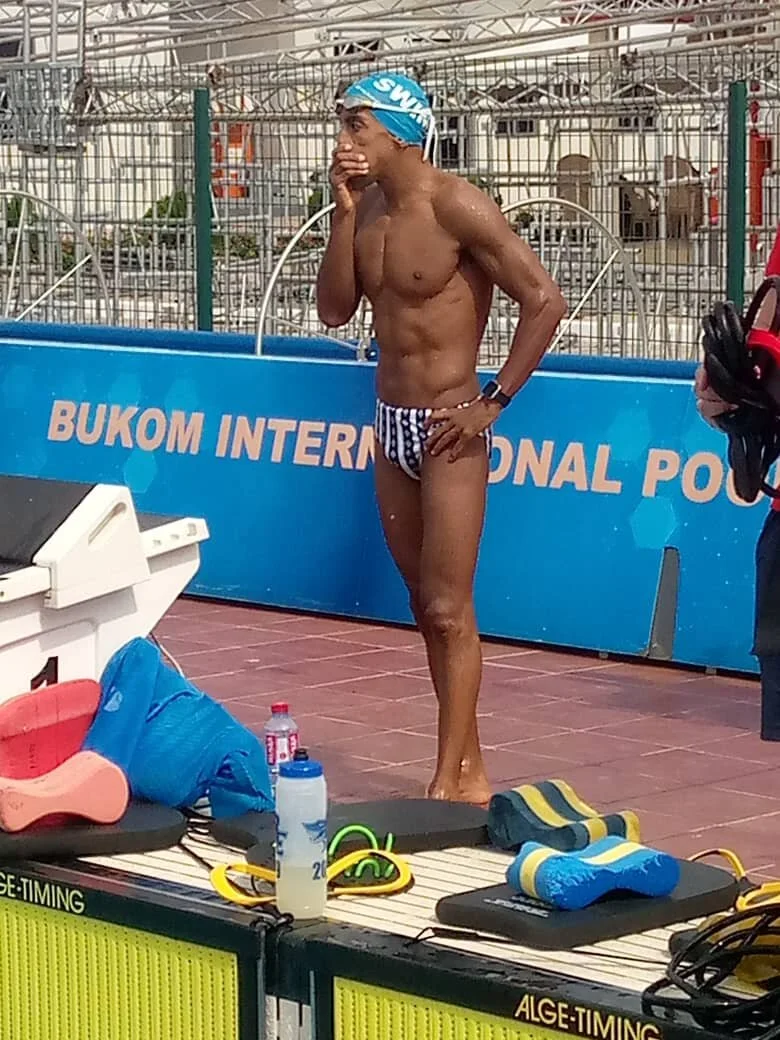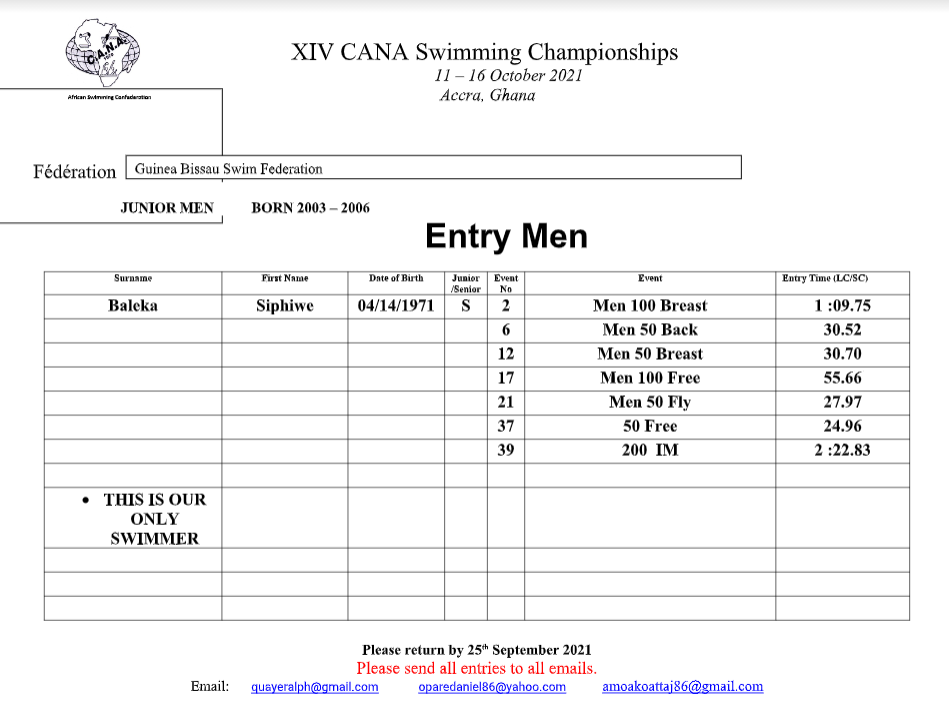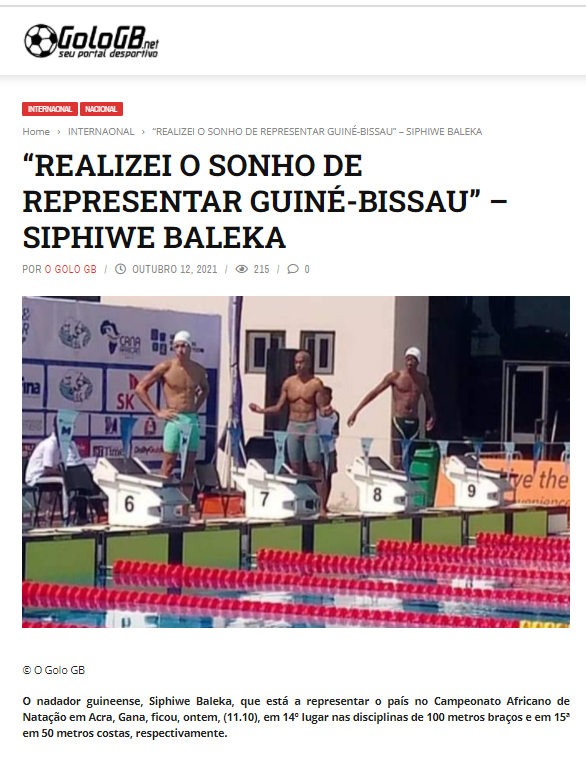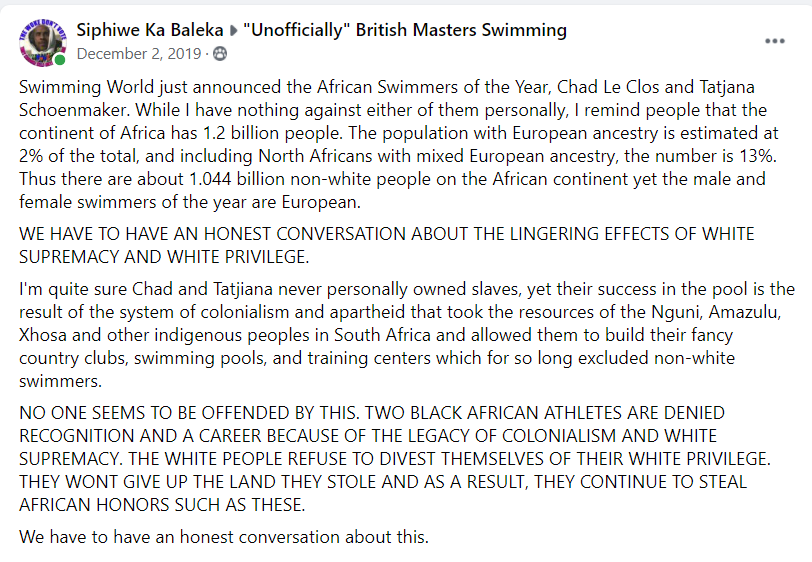Photo courtesy of the Guinea Bissau Swim Federation
Bukom Pool, Trust Sports Emporium in Accra, Ghana - October 11-16, 2021
This is not an easy article to write. Like all things in the universe, there is a unity of opposites - heat and cold make the unity “temperature”; inhale and exhale make the unity of “breathe”; expand and contract make the unity of a “heartbeat”; light and dark, night and day, etc. … Likewise, my experience at the 14th African Swimming Championships is both joy and sorrow, pride and shame. If I am going to write honestly, If I am going to document this historic occasion, my own standards of authenticity, openness, honesty and duty require that I go beyond the fluff pieces of sports journalism. I have to keep it real. I have to be courageous and vulnerable. Expose and uplift. . . .
Photo courtesy of the Guinea Bissau Swim Federation
The Joy and Pride
First, let me start with my results.
Event #2 Men 100 Breast - 1:12.04 -14th place
Event #6 Men 50 Back - 31.60 15th place
Event #12 Men 50 Breast - 31.79 13th place
Event #17 Men 100 Free - 57.01 15th place
Event # 37 Men 50 Free - 25.37 25th place
I swam the 50 meter freestyle at 25.37, a little slower than I swam in Egypt in June while trying to qualify for the Olympics (25.25). It was my best race in the competition and I'm happy with my performance. I can say that I did my best for Guinea-Bissau.
I had hoped to swim faster in my other events, especially the 100 Meter Breast and 100 Meter Freestyle. But after my first swim, I realized that the important thing was my EXPERIENCE and not my times. I had to adjust my mindset because the purpose of this competition was above all, to represent Guinea Bissau for the first time at the African Swimming Championships and thereby establish a swimming legacy for Guinea Bissau. I would be a fool to deny myself the opportunity to simply enjoy doing that simply because I wasn’t swimming as fast as I wanted. Moreover, I also had to take into consideration the circumstances under which I had been training for the past five months - I had relocated from Springfield, MO during the COVID pandemic, to Bairo Militar, Bissau. I went from training in an evironment that was producing collegiate national champions and US Olympic trials qualifiers in a high level training facility to swimming by myself with no coach or teammates, in a 25 meter hotel pool with no lane lines, lane or wall markings, in water that was 87 degrees or warmer! To overcome this training struggle, I relied on the MySwimPro app and was following its ten week IMX Pro Challenge training plan to build some good endurance for those 100’s. Plus there was the stress of my Olympic fiasco. Like many Afrodescendant athletes in the United States, I, too, was having my own mental health issues related to sports. I realized in Ghana that it was more important for me to focus on the fact that here I was RACING in Africa with other African swimmers - something that very few, if any, African American swimmers have ever done, and certainly not representing an African country at the continental swimming championships! . It was time for me to just swim, race, and make friends.
O Golo GB, Guinea Bissau’s premiere online sports news agency, noted, however, that all of my swims established National Records for Guinea Bissau.
According to the FINA Masters Swimming World Rankings for the male age group 50-54, the best time last year (2020) was Cristiano Baldinin with 25.87 . My swims in Cairo and Accra are likely to be ranked #1 in the world in this category in 2021.
Earlier this year, I swam the 100 meters freestyle in 55.90. That should also place me in the top three in the world in the men's 50-54 group.
All of my other times for the 14th African Swimming Championships will likely be in the top 5 in the world in the Men's 50-54 Group.
FINA Masters Top Ten 2020
14th African Swimming Championships results Men 50 Meter Free - #25 Siphiwe Baleka 25.37
GUINEA BISSAU - AFRICA - NOW HAS ONE OF THE BEST MASTERS SWIMMERS IN THE WORLD. BUT WILL ANYONE NOTICE?
The last time I competed in the FINA Masters World Championships in 2017, I won four silver medals but failed to become a world champion. That same year, at the age of 45, I was the oldest competitor in the Arena Pro Swim Series in the United States. My goal now is to win an event at the FINA Masters World Championship next year in Japan, where I will compete against competitors from my own group. In Ghana, I was the oldest competitor, with the second oldest being Marc Pascal Dansou, 38, from Benin.
The Sorrow and Shame
To truly understand the full dimension of my experience at the 14th African Swimming Championships, it’s necessary to go back a few years. In December of 2015 I sent the following email to Mel Goldstein, Vice Chairman FINA Masters Technical Committee:
“From: Siphiwe Baleka <fitnesstrucking@gmail.com>
Date: Wed, Dec 16, 2015 at 5:06 PM
Subject: Competing in Africa in 2016
To: Mel Goldstein <goldsteinmel@sbcglobal.net>
Greetings Mel,
Any opportunity for me to compete somewhere in Africa in 2016?
Siphiwe Baleka www.siphiwebaleka.com”
After receiving no response from Mr. Goldstein, I sent the following email two weeks later to every person I could find connected to swimming in Africa:
“From: Siphiwe Baleka <fitnesstrucking@gmail.com>
Date: Sat, Jan 2, 2016 at 3:02 PM
Subject: Competing in Africa in 2016
To: Mel Goldstein <goldsteinmel@sbcglobal.net>, Laura Hamel <lhamel@usms.org>
Cc: Shaun Adriaanse <canazone4secretariat@gmail.com>, analima29@hotmail.com, info@samastersswimming.com, kennedy@yebo.co.za, guyh@summercon.co.za, wahoosecretary@gmail.com, pjduffy@broll.com, bosmead@gmail.com, mangelos@mweb.co.za, "winrose@telkomsa.net" <winrose@telkomsa.net>, "odendaalannemarie0@gmail.com" <odendaalannemarie0@gmail.com>, "judy.collins@vodamail.co.za" <judy.collins@vodamail.co.za>, "hestersnyman@mweb.co.za" <hestersnyman@mweb.co.za>, marinetzswimmingclub@gmail.com, info@swimafrica.net, sports@ug.edu.gh, headofschool@lincoln.edu.gh, kmoolchandani@lincoln.edu.gh, info@softkenya.com, eth@telecom.net.et, "Green, Robert (DPR)" <robert.green@dc.gov>, Kathy Cooper <blackheritageswimming@gmail.com>
Greetings,
This email is going out to people and organizations that may be interested in my effort to become a World Champion at the 2017 FINA Masters World Championships (Men's 45-49 Age Group). If I am successful, I may become the first African American Masters Swimming World Champion. In preparation, I am planning to connect my passion for swimming with my ancestral heritage, something I did in 2012 when I became the US Masters Swimming National Champion in two evetns (see https://www.growingbolder.com/siphiwe-baleka-in-for-the-long-haul-735035/ ) and then became the first African American to complete Ironman South Africa (see http://www.siphiwebaleka.com/merch/triblackalete).
In preparation for 2017 Masters Swimming World Championships, I am planning my own personal Black Swimming tour in 2016 that begins with the 30th Annual Black History Invitational Swim Meet in Washington, D.C. February 12th through the 16th. Then moves to the 14th Annual National Black Heritage Swim Meet in Cary, North Carolina May 28-29. I am hoping to culminate this tour with a competition in Africa sometime between August and December 2016. The purpose of such a trip would be:
1) interest African Americans in the sport of swimming at all levels, from kids through masters
2) provide historical and cultural components to the sport
3) connect black swimmers in America with black swimmers in Africa
4) propsect on possibilities for coaching black swimmers in Africa
5) compete against some of the best swimmers, white and black, on the African continent
6) provide personal fulfilment returning to the continent
In essence, this campaign is a way for me to combine two of the most important things in my life: my ancestors and swimming.
If you are able to provide any information about any opportunities to compete and participate in any ongoing swimming program on the African continent in the second half of 2016, please don't hesitate to contact me.
To find out more about me, watch the Fox Sports video here: http://www.siphiwebaleka.com/ --Respectfully,
Siphiwe Baleka”
THUS BEGAN MY EFFORT TO COMPETE IM AFRICA AND TO GIVE BACK TO THE SPORT I LOVED AND TO THOSE THAT NEEDED IT THE MOST - BLACK SWIMMERS IN AFRICA!
I went on to win four silver medals at the FINA Masters World Championships in 2017 in Budapest, but I heard nothing from anyone in Africa about Swimming and competing there. And this started my disappointment with FINA and specifically Confederation Africaine de Natation (C.A.N.A) - the African Swimming Federation that governs the sport on the continent.
Why weren't FINA and CANA being more helpful?
Afterall, how often do they receive such inquiries from such an experienced and passionate African American swimmer? Surely I had something valuable to offer CANA and to the next generation of swimmers in Africa. Didn't they want my help? My inability to establish effective communications would continue to be a problem even once I relocated to Africa.
Now, fast forward three years. I heard nothing from no one at FINA or CANA. Then I had the following email exchange that started August 23, 2019 -
“----- Forwarded Message -----
From: Siphiwe Baleka <fitnesstrucking@gmail.com>
To: Kyle Deery <kdeery@usms.org>; Kyle Deery <kdeery@usmastersswimming.org>
Cc: Mel Goldstein <goldsteinmel@sbcglobal.net>;
Sent: Friday, August 23, 2019, 11:56:18 AM EDT
Subject: Contacting Senegal and Guinea Bissau Swim Federations
Greetings Kyle,
My apologies for all the requests lately, but with Laura not at USMS anymore, you are the only one that I know. I need help contacting Dr. Mohamed Diop, FINA Bureau Member from Dakar. I will be traveling to Senegal and Guinea Bissau in late December and I want to do some swim related activities, possibly some swim clinics. I need swimming contacts in these countries. Perhaps USA Swimming can help as well. I've contacted Mel Goldstein previously and he is CC'd on this email as well. I appreciate any help or contacts that you can provide.
-- Respectfully,
Siphiwe Baleka
From: Mel Goldstein <goldsteinmel@sbcglobal.net>
Date: Fri, Aug 23, 2019 at 7:26 PM
Subject: Re: Contacting Senegal and Guinea Bissau Swim Federations
To: Siphiwe Baleka <fitnesstrucking@gmail.com>
Siphiwe
Mohamond is from Senegal not Dakar.. I will forward your message to him and he will contact you if his federation is interested
From: Siphiwe Baleka <fitnesstrucking@gmail.com>
Date: Fri, Aug 23, 2019 at 7:33 PM
Subject: Re: Contacting Senegal and Guinea Bissau Swim Federations
To: Mel Goldstein <goldsteinmel@sbcglobal.net>
Mel, Dakar is the capital of Senegal.
From: Mel Goldstein <goldsteinmel@sbcglobal.net>
Date: Sat, Aug 24, 2019 at 2:24 AM
Subject: Re: Contacting Senegal and Guinea Bissau Swim Federations
To: Siphiwe Baleka <fitnesstrucking@gmail.com>,
Yes, my bad thinking of Doha .. I have sent your message to Mohammod.
Mel Goldstein Education Services | U.S. Masters Swimming
Le 27 août 2019 21:08, Mel Goldstein <goldsteinmel@sbcglobal.net> a écrit :
Mohamed,
I hope your travels were uneventful as was mine... This gentlemen contacted our National Office and wanted to make contact with you... I am reluctant to give out information. If you want to contact him his email is below...
I still want that blue shirt...
Mel Goldstein
Education Services | U.S. Masters Swimming
Now, notice the tone of Mr. Goldstein. In his first message he tries to correct me by telling me Dr. Diop is from Senegal and not Dakar, not realizing that Dakar is the capital of Senegal. And this coming from a man who is representing “Education Services | U.S. Masters Swimming”…!. Mr. Goldstein said he “forwarded my message” and that if Dr. Diop’s federation is interested they will contact me. This was not exactly the kind of help that I was expecting. I had been sending information to Mel about who I am and want I wanted to do in Africa since the end of 2015. I was one of the most well-known and publicized masters swimmers in the United States and this was all Mr. Goldstein could muster for me????? And this man was MY representative to the FINA Masters technical committee????? Why was he reluctant to give me the contact information for the CANA Secretary General???
AND THIS WOULD BE THE PATTERN. I volunteer information and help and in return people are reluctant to help or share information. I did, however, get a response from Dr. Diop: On Tue, Aug 27, 2019 at 7:49 PM Mohamed Diop <drmohameddiop@yahoo.fr> wrote:
“Dear Siphiwe
My friend foward me you email.
I will happy to meet you in Dakar in décembre.
Infortunally, Guinée Bissau don't have active fédération but i can give you One contact.
Please received my WhatsApp contact :
Dr Mohamed Diop
+22176xxxxxx
Regards
Mohamed”
And that was it. No questions, no conversation, nothing. I went straight to my ancestral homeland of Guinea Bissau and didn’t stop in Senegal, so Dr. Diop and I never met. However, at that time, I was serving as the North American Regional Director for the African Sports Ventures Group (ASVG). UNESCO reached out to ASVG for help with promoting the 2022 Youth Olympic Games which were scheduled to be held in Dakar. It was the first time such a competition would be held on the African continent, and ASVG asked me to come up with a plan for getting African American involvement. I was delighted and forwarded to UNESCO and Dr. Diop the following concept paper:
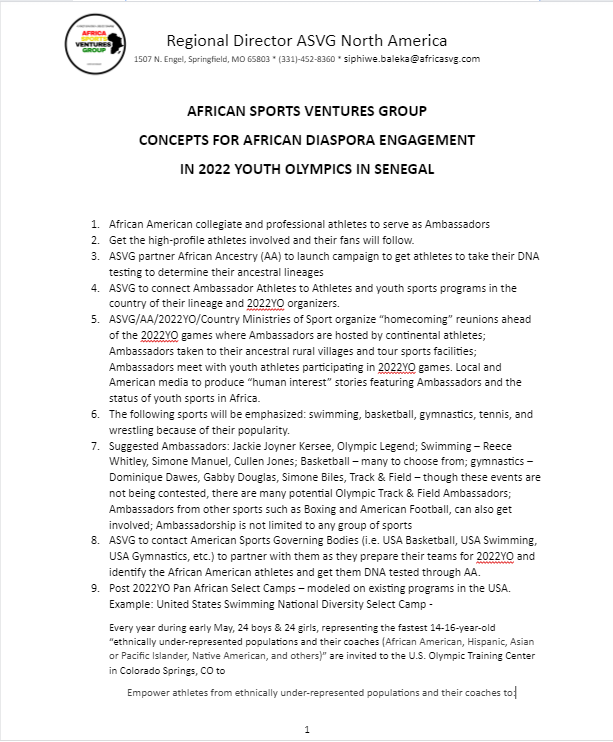
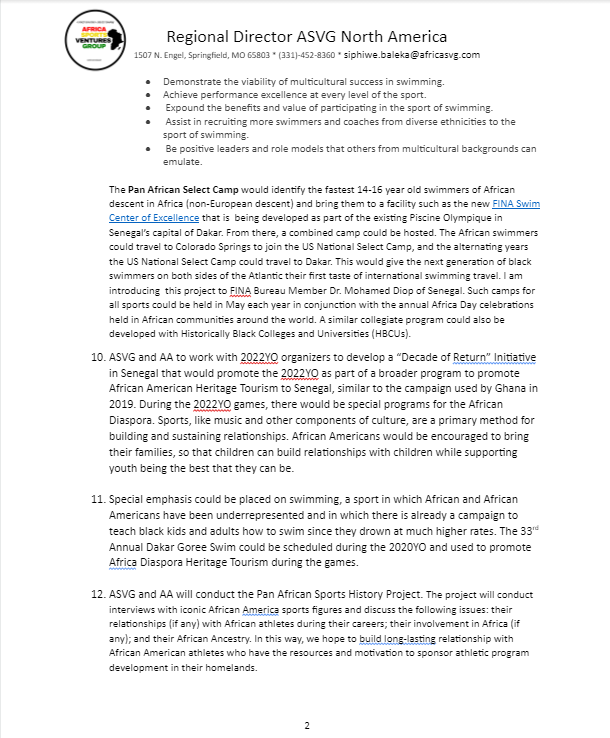
Due to COVID, the 2022 Youth Olympic games have been posponed to 2026. But the Secretary General of Confederation Africaine de Natation (C.A.N.A) - the African Swimming Federation - Dr. Diop, from Dakar, Senegal, showed very little interest. No further conversation on my concept paper was had and no effort has been made since. Here I was, offering what I thought would be a great contribution to African Swimming - the Pan African Select Camp and a potential partnership with the United States Swimming National Diversity Select Camp, building heritage tourism around swimming - and no one was interested!
But here I was, nonetheless, at the 14th African Swimming Championships. Getting here wasn’t easy. First of all, very little meet information was posted on the CANA website. To get any details, you have to get the meet information called the Team Leaders Guide. This information is only available to the officers of the federation. Such information should be posted to the CANA website for transparency. That would allow coaches, swimmers and officials better access to the information and make planning and preparations much easier.
For example, if I wanted to enter the 2021 Toyota US Open, an international competition, I would go to the USA Swimming Online Meet Entry (OME) System of which I am a registered athlete member unattached to any team, and I would select the meet information. If I am a coach, I can enter my team. If I am an individual unattached to any team, I can enter myself.
If CANA had such a system, it could add the option of “Enter a Federation”. In this way, it would make the entry process much more robust and streamlined, more accessible and user-friendly, and decrease the amount of work that the host committee has to do.
When I tried to enter the meet, I had difficulty because the Guinea Bissau Swim Federation (GBSF) is new and inexperience and knew nothing about the 14th African Swimming Championships. Plus, there’s a language barrier between me and the GBSF officers who speak Portuguese and not English. The meet information is published in English. And as I have been repeatedly told, FINA and CANA “don’t deal with individuals, we only talk to the federation.” Since I have no official position with GBSF, neither FINA nor CANA wanted to share any information with me about entering the meet. I was left to the mercy of GBSF Officers who have no swimming background and didn’t even know about the competition to get information, translate it, understand it, communicate it with me, and submit my entries in a timely fashion. It was this situation which caused me to not swim in the Olympics. So I had to help te GBSF get the Team Leaders Packet and then share it with me. Then I had to do my own entries for the GBSF and then help GBSF send my entry to GSA hosts! I couldn’t believe that the 14th African Swimming Championships were only receiving PAPER entries submitted by the national federations! They then have to MANUALLY enter each swimmer’s entries and they were still doing this days into the competition!!!! It felt as if I had stepped back into the 1980’s when my father was doing meet entries on his computer and printing heat sheets and deck cards in our house!
As a result of this entry process, there was no psyche sheet available before the competition started, which, for a continental championship, is just unacceptable. Coming to the meet, I had no idea the level of competition I was facing, the number of swimmers, anything. I couldn’t do much forecasting or planning of my competition day routine because I had no idea how many heats there would be, how much time between my events, etc. Like everyone else, I just had to go with the flo and play it by ear.
There was another problem just entering the meet and getting settled in Ghana. According to the Team Leaders Guide, the only room options available were a single or a double room. My Team Manager and I decided it would be best for us to get one suite and share it. We were going to be there ten days and we didn’t want to be trapped in a small hotel room. That’s not conducive to being comfortable and performing well. When we requested to get a suite, Farida Iddriss of the Ghana Swimming Association (GSA) told us that wasn’t possible. But of course it was possible, because we went ahead and made our own reservations with the Best Western Premiere Hotel, reserving a King Suite. We then asked Ms. Iddriss what remaining fees there were (to cover transportation and meals). We were rather surprised to find out that GSA couldn’t make any adjustment - “Please note that, as accomodation was not done through the Ghana Swimming Association. We will here by want to inform you that, you will not be provided Internal transportation and meals.”
That was annoying. I used Google maps to see how far the hotel was from the pool and it showed that it was going to be about a 40 minute drive each way! It didn’t make sense to me that GSA couldn’t make an adjustment simply because we wanted a different kind of room that was more suitable for us. I anticipated that having to take an taxi or Uber to the pool and back twice each day (prelims and finals) would be expensive. Why couldn’t they allow us to pay a fair price to ride the bus with all the other teams?
Fortunately, after arriving in Ghana and speaking to other members of the GSA, we were informed that since we were staying at the same hotel, we could, indeed ride the bus from the hotel to the pool. However, this would become a huge problem for all the team throughout the meet. The bus schedules weren’t posted, there was plenty of confusion, buses were arriving and departing late, and sometimes it would take more than an hour to get from the hotel to the pool or vice versa. Since our delegation consisted of just two people, we made the quick decision to relocate after the second night to a three-bedroom Airbnb apartment close to the pool at 1/3rd the price of the hotel! This worked out very well for us and we realized that doing things on our own saved us a lot of time, money and frustration. We didn’t have to wait around….
This also highlghted another difference between how things are done in the United States vs. Africa. It would be absurd for the meet hosts to handle hotel arrangements for all teams! Rather, hotel information is provided in the meet information and each team/swimmer can choose their own accommodations. Of course, this is a much greater challenge for an international competition, especially in Africa where you have different languages. It’s great that the GSA took the responsibility for making hotel arrangements, but their communication and ability to adjust to the needs of each federation/team was severely challenged. For the first half of the meet, information desks at each of the major hotels was not staffed, bus schedules were not posted and enforced, the meals provided were the same buffet style meals EVERYDAY….. The problem trusting the whole operation to the host federation is that whatever they don’t get right, everybody suffers….
There was a team leaders meeting the afternoon before the competition. We arrived and that was my first look at the Bukom International Pool. It was beautiful. I was excited. But then I only say the single 50 meter competition pool. Where was the warmup/warmdown pool. I discovered there was none. In the team leaders meeting, I asked, “Will there be any breaks during the senior prelim session for warm up or warm down since there is no separate pool for that?” Sam Ramsamy, the CANA President, said, “No.” I then asked, “Not even a 10 minute break at the halfway point?” Mr. Ramsamy said, “No. 10 minutes isn’t going to help a swimmer anyway.” I looked at him incredulously, Here we were at the CONTINENTAL championships for Africa and once the meet starts, there’s no warmup or warmdown available. I sat dumbfounded. For me personally, as a 50-year-old swimmer, my body just cant recover the way it used to. I have to warm down after every race and flush the lactic acid out of my system and usually I’m good for just two races per session. On the first day I had a 100 breast/50 back double and on the last day I had a 50 free/200 IM double. I needed the opportunity to swim down between races. I knew other swimmers needed it, too. So I then asked, “So that means that some swimmers who may only be swimming the last two events, have to sit around after warmup, perhaps for an hour or longer, and swim their race with no warmup?” Mr. Ramsamy responded as if I was deliberately trying to cause a problem. But all the team leaders and coaches agreed with me. Mr. Ramsamy’s final response was to use the fact that 1) they were combining the Junior and Senior Championships for the first time and 2) they were trying to do this under COVID restrictions and therefore everyone had to make sacrifices and be understanding. Yet in the same breath, Mr. Ramsamy said that their focus and everything they were doing was for the benefit of the swimmers. . . . .
On Monday morning I arrived at the pool. Just before warmups I finally got to see the heat sheet for the day’s session. There were just two heats of the first event, the women’s 100 meter freestyle, and two heats of event #2, the Men’s 100 meter breastroke. Wait a minute. The Ghana Swimming Association announced on their Facebook page that there were 420 swimmers from 42 countries at the competition. I was expectating way more swimmers than this! Just 16 swimmers in the 100 breast???? Two heats in a CONTINENTAL CHAMPIONSHIP???? I just couldn’t believe it.
I was in the second heat of the 100 breast. While we were in the ready room, we heard the starter say, “Take your mark ……” Then there was some loud squeaking from the PA system. Most of the swimmers thought the squeak was the actuall start and they took off. Two swimmers were still standing on the blocks and never started….. At the 75 meter point, the referee tried to stop the swimmers. Some stopped, some finished the race, with no time. The whole think was a very unfortunate start to the 14th African Swimming Championships. I sat there in disbelief. In fact, I sat there feeling ashamed. It was embarrasing that this, MY championship, my CONTINENTAL CHAMPIONSHIPS, the thing that I was so proud to be a part of - I felt ashamed knowing that this was the level of production, the best level, available in Africa. Once again, it was the inferiority thing. Why must Africans always be associated with the lowest level of standards???
Now, I was born and raised in the United States. I have been in competitive swimming since the age of 8. I have swum at the highest levels of age group, high school, college, national and masters swimming. I was an athlete representative for Illinois Swimming to United States Swimming for two years. My father help developed the software systems that connecting the timing system to the computers and did all the meet entry, heat sheets, etc. since the 1980’s. So I know how things are supposed to run at the local club, LSC, regional and national levels. I know how competitions are organized, how they run, etc. So when you know HOW things are SUPPOSED to work, it makes it easy to see what isn’t working or what is missing. At that moment I felt shame and sorrow that swimming in Africa was this far behind the rest of the world. I realized, I had expected too much. We all had. In many of the longer races, there were so few entreants that the events was canceled in the preliminaries and all swimmers were automatically moved to the finals. This happened even in the women’s 200 free! All the coaches and swimmers were just in disbelief at what was happening. But then, what could we do? We all just relaxed and made the best of it. Which, ironically, took away a lot of the pressure and made the experience more friendly and enjoyable. “Just do the best you can under the circumstances” seemed to be the spirit of the meet.
A little more than halfway through the meet, there was a second Team Leaders meetings where an attempt was made to solve problems and make things better. And the running of the meet did improve by the final few days. The announcing improved. The award ceremonies improved. They figured out how to raise the flags up the flagpole…. But there was still communication issues even at the end of the meet. People had to get COVID tests arranged, etc.
Finally, there is then the issue that no one ever talks about but is right out there in the open. There are some very, VERY fast swimmers in Africa. Some of the best in the world. And these swimmers are of Arabic and European heritages from Egypt, South Africa, Algeria and Tunisia. I have nothing against these swimmers personally and have made friends with a number of them. Indeed, I spent a little bit of time with South African Swim Coach Graham Hill who is a great guy whom I now consider a colleague and friend.
However, in December of 2019, I made the following post on Facebook:
At the 14th African Swimming Championship, there was a pattern. In both the prelims and finals, the middle lanes were almost always (just a few exceptions) occupied by non-black swimmers from Egypt and South Africa and Algeria, and rounding out the outside lanes were the black swimmers. Look at the combined team scores:
Both Egypt and South Africa outscored ALL THE OTHER TEAMS COMBINED!. Now, consider this. On August 9, 2021, FINA president Husain Al-Musallam has reiterated his desire to expand global access to swimming with a new initiative to increase investment in African swimming. According to the announcement made by Swimming World, that investment is put at $29 million over the next four years. The reports states,
“The first of those announced investments is an elite training center in Tunisia, the nation that produced men’s 400 freestyle gold medalist Ahmed Hafnaoui as a beacon of promise for the continent. FINA has also identified Senegal and two universities in South African for elite training bases, as well as other new establishments in Hungary and Russia.”
AND THERE IT IS RIGHT THERE.
One of my teachors said that the functional definition of justice is “no one is mistreated and those that need the most help get the most help.” If there were, in fact, 42 countries at the 14th African Swimming Championships, then that means 19 countries, including Guinea Bissau, didn’t even score a point. Wouldn’t justice require that a significant amount of FINA’$29 million investment in African swimming over the next four years go to those countries who clearly need the most help? South Africa already has the best swimming program in Africa, and Tunisia is doing great already on its own. How was the decision made to give those countries, along with Hungary and Russia (which aren’t African) help? More importantly, WHO made those decisions? Because if you were to ask the people that care the most about developing swimming in Africa - the coaches and swimmers who were on the deck - they would have made very serious and specific requests for help that would reach the black swimmers who represent 75% of the continent. Coaches and swimmers I met and admired from Uganda, Angola, Tanzania, Zimbabwe, Mali.
So this is why I started this article by saying that it is difficult for me to write, that my experience was both joy and sorrow, pride and shame. To write truthfully about my experience requires expressing both. And there are some people who will criticize me saying that Africa already has it bad enough. Why must you tell these things. You should try emphasize the good things. ANd of course, that is my intention. That has always been my intention since I first sought to find a way to contribute to African swimming back in 2015. I am not bad-mouthing Africa. I live here and encourage the African Diaspora to prepare themselves to come home and build the Africa of tomorrow. But if you don’t first diagnose the patient, identify what is wrong and what needs to be done, how will the patient ever be treated and cured?
Bob Marley once sang, “Check out the real situation…..” Most of the swimming world, and especially the swimming world in the United States, knows nothing about the real situation of swimming in Africa. As one of the Senior Statesmen of African American Swimming and the first to fully repatriate and compete for an African nation - someone with a reputation as a Fitness Guru that has appeared in US mainstream media such as the Atlantic, Sports Illustrated, Good Moring America, CBS Evening News, and many, many others, I am the perfect person to expose the real situation so that attention and resources can be brought to bear on it and improvement made. That’s why I am writing this. I want people to reach out and say, how can I help? What do you need? And hopefully, with my success, more athletes and coaches will bring their talent to their anesctral homelands like I have done. Not just for swimming, but for all sports. And in this way we make our contribution to building Africa’s sports infrastructure. When that happens, Africa’s youth will no longer dream of leaving Africa to play in Europe and America. Instead, the African Diaspora youth will dream of returning to Africa to play.
Siphiwe Baleka, representing Guinea Bissau, in the Parade of Nations at the 14th African Swimming Championships.
